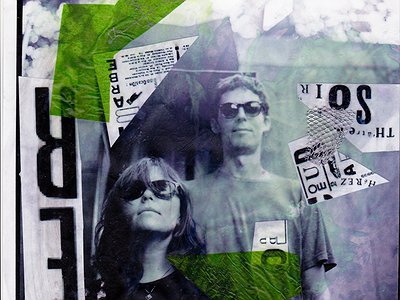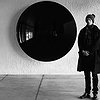How strictly do you separate improvising and composing?
VM: There isn’t a strict ratio. I love improvising especially live where every night you play against different walls in front of different faces.
Structure is more challenging sometimes, in a way we often tend to get carried away by the wall of sounds that two people can produce. It is quite uplifting and also an easy way out! On the new recordings there are a couple of highly structured tracks where we managed to follow rhythmically, every note of the analogue synthesiser's arpeggios.
TR: Some of our tracks are totally improvised, some are composed, and the tension that emerges between these two states when we play them live is amazing and creates new inter-zones constantly. It feels like every time we make a composition it will create several new zones of improv around it, especially when we’re on tour and our brains are saturated only with music and the changing landscape and faces of whatever country we are in.
How do you see the relationship between sound, space and composition and what are some of your strategies and approaches of working with them?
TR: Tomaga was only started in 2013 so it is relatively young as a project and we have been working hard and touring constantly. Already I feel like we are developing in the direction of wanting more space in our music, both in terms of space vs sounds, and ‘space’ to improvise vs composed content when we play live.
VM: Some new material that will be released in 2016 has very few elements, it is very minimal. I think we are more confident now to make music like this, after these 2 years working together. Increasingly I think that the relationship between sound, space and composition is exactly like cooking. By which I mean, every ingredient must be given its respect and space. Some ingredients have very strong flavours and must be given lots of space and perhaps combined with only a few other ingredients, whereas some are best combined with several other things. I cannot remember which studio I was in when an engineer told me that you should always be suspicious of a music producer who cannot cook well, since the dynamic is very similar!
What's your perspective on the relationship between music and other forms of art – painting, video art and cinema, for example – and for you and your work, how does music relate to other senses than hearing alone?
VM: Interaction between music and other forms of art is one of our biggest goals. It is impossible to isolate music from all the other forms of expression. I always try to imagine what Tomaga music would smell like.
We presented our profile on social network as a “radio station” trying to incorporate as many artistic elements of what’s “out there” as possible.
We are strongly intrigued by cinema, contemporary dance and visual arts. They are all incredible channels to express what we do with the same strong impact. Every single day off when on tour is spent in museums, galleries and visiting odd architectural landmarks.
We have also been curating a limited run of zines together with a fantastic Italian editor Agnese Fortuna, collecting collages, photos, recipes, pieces of fiction and everything that stimulates our imagination. We sold out the first three issues so far and will soon begin work on the next issues. Regarding the artwork for our releases we spend a long time discussing, choosing the right font, images, colours that can somehow relate to what our music sounds like. I personally pick a crude, strong iconic impact. I fear the abstract and water colours. I have a strong liking for acrylics, textures, info-graphic and anatomy used in art. Fritz Kahn, Eduardo Paolozzi and Roland Topor would be my dream choice if I could ever pick an artist to design the next Tomaga sleeve.
So far we have been lucky to be assisted by great visual artists like Ross Adams who designed the covers of Futura Grotesk and Familiar Obstacles.
TR: There is a natural cinematic element to our music and I would love to work with a film maker on a piece of film. Several people have made videos to our music and it has worked very well, but I’m keen to engage the process in reverse and make music for a film that exists already.
Late in 2015 we were asked by Turner Contemporary in Margate to make a performance using the artworks of Pedro Reyes, which are weapons confiscated from drug cartels by the Mexican Police that have been reconditioned as musical instruments. It was very interesting to use these weapons to make music since it felt like there was an emotional charge to them that came through in the music. Based on this experience I think it would be very interesting for Tomaga to do more site-specific, or object-specific sound work, and see if we can engage further with the emotional charge of other places and objects.
What's your view on the role and function of music as well as the (e.g. political/social/creative) tasks of artists today : and how do you try to meet these goals in your work?
VM: I am not sure if there is a specific answer to this. What music does for you is extremely personal, for some it's therapy or distraction, for others it's entertainment. The musician is the one in the middle of it all trying to keep the right balance between the role assigned that can be accordingly spiritual healer, entertainer or prostitute. I try to stay away from specific roles. As much as possible I try help other artists getting out there, setting up DIY shows, working with many different indie labels etc…
Teaching drums is also a great way to share my passion for the instrument and hopefully give something to my students.
TR: I think music, and art in general, is a great and unifying social force that can overcome differences in language, class, race, all of it. It is also a kind of self-therapy if you make music, or any form of art, and everyone should have access to this. We try to be as active as possible since it seems that people who see us play really respond to the energy, and that's our job - to expose people to emotional intensity through sound and hope that it can liberate them from whatever drudgery they feel in their lives.
Listening is also an active, rather than just a passive process. How do you see the role of the listener in the musical communication process?
VM: The art of processing what you hear is my definition of listening. It entails filtering. I always try to improve my listening capabilities through concentration. However I find that sometimes a distracted approach is fresher and more creative. You might pick up just shades, trivial details of what you hear and interpret in a totally original way.
TR: As a listener I try to have no preconceptions and clear my mind whenever I listen to something new. Everyone should do this because it's the path towards ultimate empathy.
Closed-mindedness creates most of the problems in the world, and music-listening is just one manifestation of that.
Reaching audiences usually involves reaching out to the press and possibly working with a PR company. What's your perspective on the promo system? In which way do music journalism and PR companies change the way music is perceived by the public?
VM: This is the side of my job that does not interest me. It is always political and down to money so I try to get involved as little as I can. So far we never had a PR for Tomaga.
TR: We are completely outside of that model so far. We have had no PR, no promotion, no advertising, just a supportive record label and a willingness to perform everywhere. This is very gratifying since we have got to where we are now purely by word of mouth. But maybe if someone invests in us that could be good for the future, to reach a wider audience, which of course we'd love to do, but meanwhile we will continue as we are.
Do you have a musical vision that you haven't been able to realise for technical or financial reasons – or an idea of what music itself could be beyond its current form?
VM: I am a record collector and hence happy with its current form. I try to spend as much money as I can on records and luckily I don’t consider myself frustrated on a technical or financial level.
TR: I'd love to build some site-specific sound works in the vein of Max Eastley or Jem Finer. We have made several percussive objects that could play themselves and it would be great to see these installed in some public place or other, but this is a side of our music that has just begun to develop, so it's too early to say....
Find Tomaga online at tomaga.bandcamp.com



